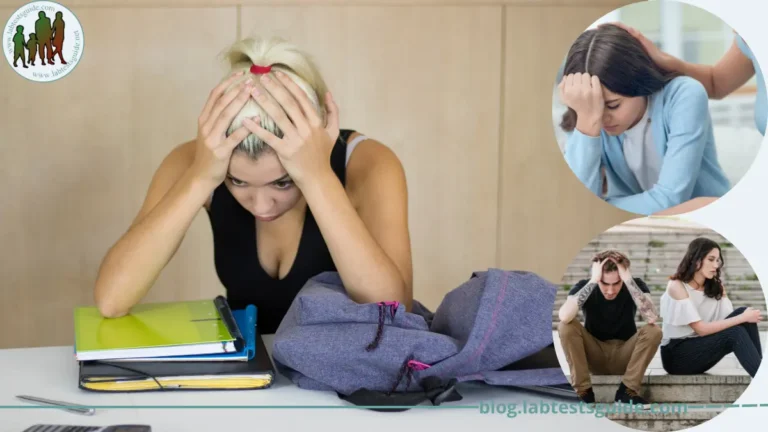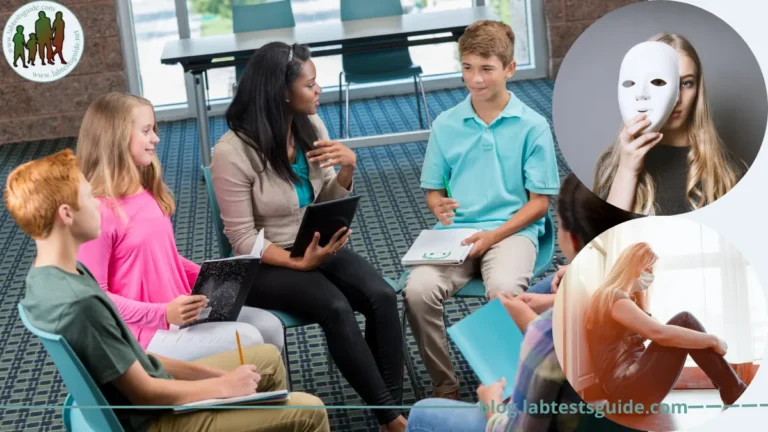Mental Health First Aid for Teens is a guide designed to help young people understand mental health and learn how to support themselves and their peers. In this guide, we’ll explore common mental health challenges, provide information about mental illness, and offer practical skills for reaching out to someone in crisis, listening without judgment, and encouraging professional help-seeking. By promoting mental health awareness and providing support tools, we can help teens build resilience and foster a culture of compassion and understanding.

Importance of mental health awareness among teens:
Adolescence is a time of great changes, both physical and emotional. Teens navigate their identities, relationships, and responsibilities, all while dealing with a variety of stressors, including academic pressures, social media, and family dynamics. As a result, mental health problems are becoming more prevalent among this age group.
According to the National Alliance on Mental Illness (NAMI), 1 in 5 young people ages 13 to 18 experience a serious mental disorder in their lifetime, and half of all mental health conditions begin by age 14. However, despite the high prevalence of mental health problems, many young people are reluctant to seek help due to the stigma surrounding mental illness or a lack of knowledge about available resources.
By promoting mental health awareness among adolescents, we can help reduce the stigma associated with mental illness and encourage young people to seek support when they need it. Educating adolescents about mental health can also help them recognize signs and symptoms of mental illness in themselves and their peers, allowing them to intervene early and prevent more serious problems from developing.
Additionally, by promoting mental health awareness, we can help create a culture of compassion and understanding around mental illness, helping to break down the barriers that prevent people from seeking the care they need. Through increased awareness and education, we can empower teens to take care of their own mental health and support others who may be struggling.
Common Mental Health Challenges:
Mental health problems are prevalent among adolescents, and it is important to recognize and understand these conditions in order to provide support and resources. Here are some of the most common mental health challenges that young people may face:
- Depression: Depression is a mood disorder that causes feelings of sadness, hopelessness, and loss of interest in activities. It can affect a person’s ability to function in daily life and can lead to suicidal thoughts or behavior.
- Anxiety: Anxiety is a condition that causes excessive worry, fear, and nervousness. It can manifest as physical symptoms such as rapid heartbeat, sweating, and tremors, and it can interfere with daily activities and relationships.
- Substance Abuse: Substance abuse refers to the use of drugs or alcohol in a way that negatively affects a person’s physical, emotional, or social well-being. It can cause addiction, withdrawal symptoms, and other health problems.
- Eating disorders: Eating disorders are mental health conditions that cause significant changes in a person’s eating habits and body image. They can include anorexia nervosa, bulimia nervosa, and binge eating disorder.
- Self-harm and suicide: Self-harm refers to intentional self-harm, such as cutting or burning oneself, while suicide is the act of taking one’s own life. These behaviors are often associated with mental health conditions such as depression, anxiety, and trauma.
It’s important to note that these are just a few examples of the mental health challenges teens may face. Mental illness can manifest itself in many different ways, and each person’s experience is unique. By understanding common mental health challenges, we can better recognize and support those who may be struggling.
Understanding Mental Illness:
Mental illness is a condition that affects a person’s thoughts, emotions, and behaviors. It can affect a person’s ability to function in daily life and can cause significant distress and impairment. Unfortunately, mental illness is often stigmatized and misunderstood, which can make it difficult for people to seek help and support.
It is important to understand that mental illness is a medical condition, just like any other physical illness. It is caused by a combination of genetic, environmental, and lifestyle factors, and is not the result of personal weakness, character flaws, or poor decisions.
Common mental illnesses: include depression, anxiety disorders, bipolar disorder, schizophrenia, and personality disorders. These conditions can have a variety of symptoms and can affect people in different ways.
Signs and symptoms of mental illness : can include changes in mood, behavior, and thinking. For example, a person with depression may experience persistent sadness, lack of energy, and feelings of hopelessness, while a person with anxiety may experience excessive worry, panic attacks, and avoidance of certain situations.
It is important to recognize that mental illness is treatable and that there are many effective treatments available, including therapy, medication, and lifestyle changes. By educating ourselves and others about mental illness, we can help reduce stigma and promote early intervention and treatment.
Here are some of the key skills taught at MHFA:
- Recognizing Warning Signs: MHFA teaches people to recognize the warning signs of mental health problems and crises, such as changes in mood, behavior, or thinking.
- Approaching someone in crisis: MHFA provides guidelines for approaching someone in crisis, including how to start a conversation, express concerns, and assess risk.
- Active Listening: MHFA emphasizes the importance of active listening, which means paying your full attention to the person speaking and not passing judgment or advice.
- Offer reassurance and information: MHFA teaches people how to offer reassurance and information to someone in crisis, including support and treatment resources.
- Encourage Professional Help-Seeking: MHFA emphasizes the importance of encouraging professional help-seeking and provides guidance on how to connect someone in crisis with the appropriate mental health services.
By developing these skills, people can be better equipped to support their peers and loved ones who may be struggling with mental health issues. Mental Health First Aid can also help reduce stigma and promote a culture of empathy and understanding around mental illness.
Applying Mental Health First Aid in Real Life:
- Case studies and scenarios
- Practical tips and strategies
- Resources for additional support
Conclusion:
In conclusion, mental health problems can affect anyone, including adolescents. It is important that people are aware of common mental health problems that affect adolescents and that they have a basic understanding of mental illness. Mental Health First Aid (MHFA) skills can be applied in a variety of settings to help people struggling with mental health issues, including recognizing warning signs, approaching people in crisis with empathy and understanding, active listening, offering reassurance and information, and encouraging professional help-seeking. By applying MHFA skills in real life situations, individuals can help reduce the stigma surrounding mental illness and promote a culture of empathy and understanding. It is crucial to remember that the MHFA is not a substitute for professional mental health treatment, and it is important to seek immediate professional help if someone is experiencing a mental health crisis. Overall, promoting mental health awareness and MHFA skills can help create a safer, more supportive, and more compassionate environment for all.






